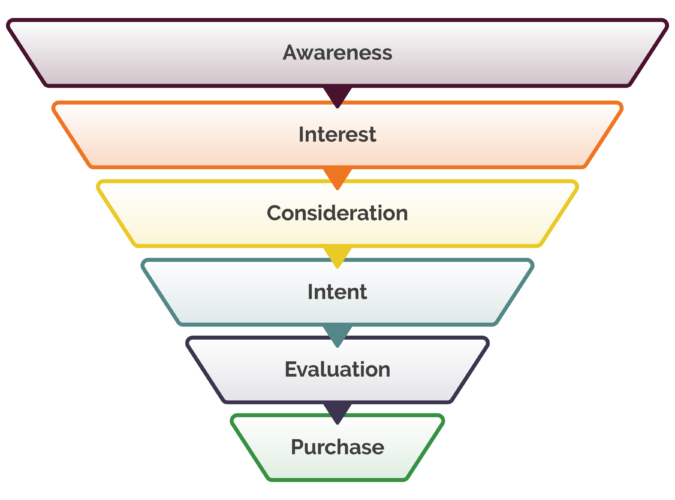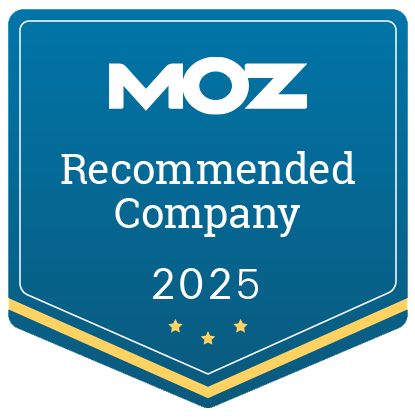In digital marketing, the marketing funnel serves as a blueprint to understand the potential customer’s journey from first awareness of the brand to the final purchase stage. This framework simplifies the process of converting a stranger into a lifelong, loyal customer.
The marketing funnel, whether used for B2B or B2C, consists of multiple stages:
- Awareness Stage: This is the first stage of the marketing funnel, positioning the brand or product in the public consciousness.
- Interest Stage: At this point, prospective buyers start showing curiosity about the brand and seeking out more information.
- Consideration Stage: Customers weigh the brand against competitors, deciding whether it'll address their needs.
- Intent Stage: Transitioning into a more critical phase, customers demonstrate clear intent towards the brand's offerings.
- Evaluation Stage: Now, customers are close to making a purchase but are evaluating the final specifics.
- Purchase Stage: Finally, the customer completes the transaction, effectively entering the brand's loyal community.
Effective content marketing plays a critical role across these stages, specifically aiming to guide users down the digital marketing funnel. Each stage utilizes a specific content strategy, enhancing the effectiveness of your full-funnel marketing efforts.
The Evolution of the Marketing Funnel
The traditional marketing funnel, once thought to be a straightforward path from awareness to purchasing stages, has changed drastically over the years. Now, it reflects the complex, non-linear journey of today’s digital customers.
One of these changes is the importance of content marketing in digital spaces. Businesses started investing resources into crafting tailored content for every phase –– awareness, interest, consideration, intent, evaluation, and purchase. This content marketing funnel offers a more personalized approach to building and sustaining customer relationships.
Other advancements, such as interactive media and social networking, birthed variations of the marketing funnel, such as full-funnel marketing, which focuses on customer engagement beyond just conversion.
Stages of the Marketing Funnel
Awareness Stage
At the awareness stage of the marketing funnel, potential customers learn of your product or service for the first time. Personalized content, targeted ads, or a social media campaign make this initial introduction impactful. Simultaneously, prospective clients gain an insight into your brand's reliability and potential in fulfilling their needs.
Interest Stage
The interest stage invites your audiences to engage further with your content. Through insightful blogs, emails, or informative webinars, potential buyers explore your brand in more depth. This input from your brand keeps your audience engaged and allows them to be curious about your offerings, services, or products.
Consideration Stage
At the consideration stage, buyers are actively contemplating purchasing your product or service among other options. They scrutinize specifications, compare pricing, or read user reviews. Here, in-depth product guides, comparison charts, or expert endorsements persuade audiences about your product's suitability and drive the preference toward your brand.
Intent Stage
During the intent stage, potential customers, now decisively leaning towards your brand, require motivating triggers to push them towards purchase. This includes limited-time discounts, exclusive offers, free trials, or bonus items that serve as enthralling motivators for customers to make that coveted leap—a purchase!
Evaluation Stage
The evaluation stage ensures the customers' satisfaction with their choice. Post-sale services, product tutorials, customer support, or advanced usage guides enable customers to evaluate their purchases. Happy customers often translate into repeat purchases, and brand ambassadors, inspiring customer retention.
Purchase Stage
Finally, in the purchase stage of the marketing funnel, customers have all the information they need and are ready to buy. Smooth checkout processes, flexible payment options, and quick delivery schedules encourage buyers to complete their transactions. Continue nurturing these customers through post-purchase communication for repeat business.
Marketing Funnel Content Strategies
To maximize the impact of a marketing funnel, it's essential to incorporate a tailored content strategy for each of its stages.
Awareness Stage Content Examples
In this stage, the objective is to grab attention and introduce your brand or product. Blog posts, e-books, and social media posts are just examples of awareness stage content that can introduce potential customers to your brand or product.
Interest Stage Content Examples
The interest stage, a.k.a. the second phase in the marketing funnel, aims for increased customer engagement. Webinars, newsletters, and interactive content like quizzes or surveys can be utilized to spark the interest of potential customers to further explore your product or service.
Consideration Stage Content Examples
Your consideration stage content should illustrate how your product or service solves the customer's problem. Case studies, product demonstrations, or customer testimonials are some examples of consideration phase content that can convince prospects of your merit.
Intent Stage Content Examples
The intent stage, leading towards the narrowing end of the marketing funnel, requires content that persuades potential customers to make the purchase decision. Free trials, product comparisons, or discount offers can serve as intent stage content, encouraging the customer to make a purchase.
Evaluation Stage Content Examples
The evaluation stage thrives on content that affirms the customer's decision. Supportive content in the form of comprehensive FAQs, detailed product reviews, or user manuals can reinforce the customer's choice, assuring them that they've made the right decision.
Purchase Stage Content Examples
Lastly, the purchase stage, the final stage of the marketing funnel, gears toward conversion. Seamless checkout experiences, clear return policies, and reliable customer support are quintessential components of this stage, aiding customers in finalizing their purchase, thus completing the buying journey through your tailored content marketing funnel.
Types of Marketing Funnels
As you learn more about digital marketing strategies, it's essential to distinguish between the two primary types: B2B and B2C marketing funnels. Understanding these variations can help optimize customer engagement and facilitate content creation strategies.
B2B marketing funnels often encompass a longer, more complex process with decisions made by multiple stakeholders over a protracted time. Content marketing services need to target unique pain points across different business roles. Here, tools like industry reports, webinars, case studies during the consideration stage, or free trials in the evaluation stage often take center stage.
In contrast, B2C marketing funnels are targeted towards individual consumers, focusing on quick transactions and shorter decision-making cycles. Tailored content in this context ranges from social media ads in the awareness stage to promotional offers during the purchase stage.
Regardless of the type, each marketing funnel broadly follows the stages of awareness, interest, consideration, intent, evaluation, and purchase. The concept of 'full-funnel marketing' applies universally, demanding a persistent, seamless strategy across all marketing funnel stages.
Understanding Your Marketing Funnel
With a comprehensive grasp of the marketing funnel, you're ready to unlock benefits in your marketing efforts towards attracting prospective customers! Knowing where your customer resides on the purchase journey -- awareness, interest, consideration, intent, evaluation, or purchase stage, impacts content creation. Whether it's a B2B or B2C marketing funnel, aligning content at each turn boosts personalization.
A clear view of your marketing funnel also enriches customer journey mapping. Learning about their process from awareness through purchase, strategies become pinpoint accurate. Having a grasp on how your marketing funnel works can drive increased conversion rates and higher ROI.
Every customer interaction, every piece of content shared, doubles as an opportunity for conversion. Well-timed and targeted actions, despite which portion of the funnel your customers are in, amplify conversion rates.
Implementing Best Practices for Your Marketing Funnel
The benefits of a marketing funnel are clear: enhanced targeting, improved personalization, and detailed customer journey mapping. It's a key tool to drive higher conversion rates and ROI.
Whether you're targeting multiple stakeholders in a complex B2B process, focusing on individual consumers in a quicker B2C transaction, or trying to understand how to bring customers down from the top-of-funnel strategies, remember to tailor your content to each stage of the customer journey.
You're you and your marketing team are ready to generate superior marketing ROI through precisely timed and targeted actions! The marketing funnel isn't just a concept, it's a strategy for success in the digital marketplace - embrace it and watch your business thrive.











